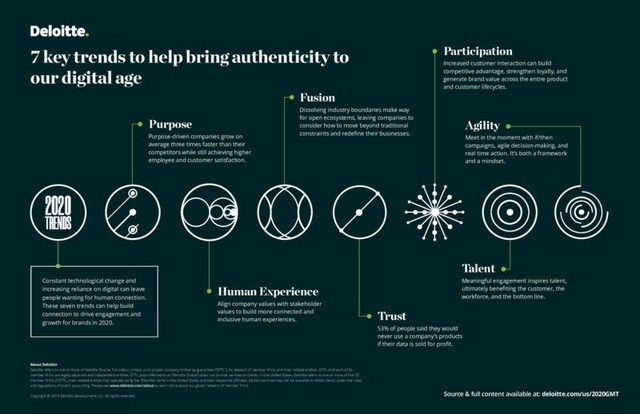Key takeaways

- Trends encompass purpose, human experience, fusion, trust, participation, talent and agility.
- A common theme across all trends — human connection matters more than anything else.
- In an increasingly digital world that often lacks a human touch, people can feel more isolated, underrepresented and unfulfilled; all reasons why the human experience is vital today.
- Digital technologies are making it easier for consumers to navigate through their busy lives, but they can also erode a human connection — increasingly creating an “experience debt” between brands and their customers.
- Companies that lead with purpose and build their ecosystems around it can achieve greater loyalty, consistency and relevance with consumers and their employees.
Why does it matter to C-suite leaders?
Every organization and individual is operating in an era of unprecedented technological innovation. According to Statista’s Internet of Things report, there are more than 26 billion smart devices in circulation — that is, more than three smart devices on average for every person across the globe — C-suite leaders are challenged to form authentic digital connections with key stakeholders. This report is designed to guide C-suite leadership in developing strategies for today’s fast-changing digital age, while keeping the human experience at the center of their work. Through interviews with more than 80 subject matter experts across the globe, Deloitte identified seven key trends that likely every business will need to focus on over the next 18 to 24 months to continue evolving socially and human-conscious enterprises.
Marketing Technology News: Maruti Suzuki Turns into a Start-up Growth Hacker for Five Companies
Elevating the human experience
While digital technologies make it easier to navigate through busy lives, they can erode the fundamental elements of human connection. When digital connections —personal and professional — lack a human touch, people can feel isolated, underrepresented and unfulfilled. This can result in quick answers to narrowly defined problems versus more sustainable solutions. The rapid pace of digital change is adding to a buildup of these unintended consequences, which Deloitte calls “experience debt.” This debt has far-reaching implications for humans who navigate these digital solutions. To pay down this experience debt, organizations and their ecosystems should focus on elevating the human experience. For businesses, this means striving to address unmet human needs for connection by aligning customers, the workforce, and partners to a common purpose.
Purpose is everything
A clear purpose can be critical for organizations — it articulates why an organization exists, what problems it is trying to solve, and who it wants to be to each human it impacts. Businesses are using purpose to create deeper connections with consumers, doing more for the communities in which they work, attract and retain talent, and achieve greater results and impact in the process. Companies that lead with purpose and build around it can achieve continued loyalty, consistency and relevance in the lives of consumers. What’s more, according to recent data from the June 2019 Harvard Business Review article, “181 Tops CEOs Have Realized Companies Need a Purpose Beyond Profit,” companies with high levels of purpose outperform the market by 5–7% per year, on par with companies with best-in-class governance and innovative capabilities. By leading with purpose, many companies are outpacing their competitors and leaving an impact on everyone they touch.
Marketing Technology News: Interview with Joelle Kaufman, CMO and Chief Revenue Officer at Dynamic Signal
The amplification of consumer participation
According to Deloitte’s “Driving band loyalty with emotion” study, nearly 75% of consumers say they expect two-way relationships with organizations they do business with. Increased customer interaction can build competitive advantage and develop a stronger relationship with the brand. Technology provides new opportunities for consumers, citizens, and communities to engage directly in shaping, influencing, building and co-creating the overall brand. Identifying how, and in which areas, to integrate customer participation into the consumer journey and the product lifecycle can be overwhelming. However, by using the models and approaches best suited to an organization’s brand and marketing strategy, businesses can successfully achieve and benefit from customer participation.
Are you a trust buster or builder?
Trust is a primary determinant in how people assess brands. In fact, according to one survey by Sprout Social, nearly 9 out of 10 Americans (86%) believe that business transparency is more important today than ever before, and 7 out of 10 (73%) will pay for products that promise total transparency. Customers, regulators, and the media expect brands to be open, honest, and consistent across all aspects of their business — from products and promotions to workforce culture and partner relationships. In an era of connected technology and big data analytics, companies should create a structure that systematically builds trust by protecting what stakeholders value most, customer data and privacy. At the same time, they should proactively detect threats in the domains of cybersecurity, data protection, regulatory compliance and reputation. By supporting the trust agenda with respect to customer data and ethical use of artificial intelligence, brands can create a more coherent, relevant and less invasive customer experience.
Marketing Technology News: Herow Announces $18.6 Million Series B











